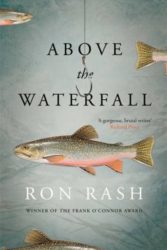 When I took on Paperback Riders last year I suggested that I wanted to find books that “help us understand and appreciate America”. A few months back we looked at Willy Vlautin’s ‘Lean On Pete’. Vlautin and Ron Rash are part of a group of authors who are documenting contemporary America to itself. They have an essential “Americanness” to their writing that maybe speaks differently to someone reading it in a small town in the Cotswolds to someone in North Dakota.
When I took on Paperback Riders last year I suggested that I wanted to find books that “help us understand and appreciate America”. A few months back we looked at Willy Vlautin’s ‘Lean On Pete’. Vlautin and Ron Rash are part of a group of authors who are documenting contemporary America to itself. They have an essential “Americanness” to their writing that maybe speaks differently to someone reading it in a small town in the Cotswolds to someone in North Dakota.
The motivation for talking about ‘Above The Waterfall’ came from a friend in the US who knowing, I had read and liked Vlautin suggested this as something I would enjoy. As Rash was on the list of writers we planned to cover anyway, I dived in.

Ron Rash is Professor in Appalachian Cultural Studies at the University of Western Carolina, and the feel he has for this part of the country jumps out from the first sentence. “Though sunlight tinges the mountains, black leather-winged bodies swing low. First fireflies blink languidly. Beyond this meadow, cicadas rev and slow like sewing machines.” The writing is beautiful, and alternates between the view of Sheriff Les Clary whose story is written as a straight narrative, almost a police report, and Becky Shytle a Park Ranger who relates her story in a prose poetry style as if to her journal.
The plot takes a while to reveal itself, and while on the surface it is a whodunnit about the pollution of a river, this is really only there to throw light on Les and Becky’s connection to each other and the place they live. The aspects of the book dealing with meth addiction and production paint a far grubbier picture than something like ‘Breaking Bad’ and felt all too realistic. The trauma that Becky is living with, surrounding that all too American problem, a school shooting, was largely skipped over. In such a character driven novel I was left with the feeling that this was something that needed plucking out and examining more closely. But maybe America doesn’t want to hear about that.
This is quite a short book, I read it in a couple of evenings, and I’m not sure that I enjoyed it all that much. The plot is mostly carried in Les’s sections of the book, and these were the most readable. Becky’s ramblings frankly became irritating after a while, and I’m not sure I understand their purpose, other than as literary devices. Like Vlautin, Rash has a vivid sense of place in his work. Unlike Vlautin the characters overwhelm the plot somewhat, and there are some characters, notably Gerald Blackwelder, the man accused of pouring kerosene into the river, and indeed Becky, who could have been fleshed out far more fully. There is a sense of the characters being there just to allow Rash to watch the world while Rash writes poetically about it. This is from one of Becky’s sections. “Memory of my grandfather’s hands, calluses round and smooth as worn coins. One morning I’d watched him cross the field, the steel oar rippling soil. In its wake, a caught wave of sillion shine. But this plow has wearied into sleep. How long lying here?” Those incomplete sentences are beautifully written, but after a while they just start to grate.
Rash says “I feel like in many ways this is my most upbeat book, because – and it’s not raising the bar too high, I understand – but it is a book about wonder as well.” Reading around Good Reads, that seems to be the view of readers as well. While his fans love it, the less convinced, including me, find the cut between the two writing styles doesn’t mesh together very well. Maybe I don’t have the cultural frame in which to set this novel. I couldn’t picture any of the characters dropped down in Yorkshire or Somerset.
That may, of course, be the point, this is an American book speaking to Americans and possibly has nothing to say to me. A New York Times article from 2009 I came across, discussed the comment attributed to George Bernard Shaw about the UK and US being “two nations divided by a common language”. They concluded that the gulf in understanding between the countries would only widen, as our shared heritage drifted into the past. And in literature, at least the sort that Ron Rash offers, that seems to be happening, making reading American writing valuable so that we can ensure we keep the connection between cultures alive and vital, despite the best efforts of our political leaders.


